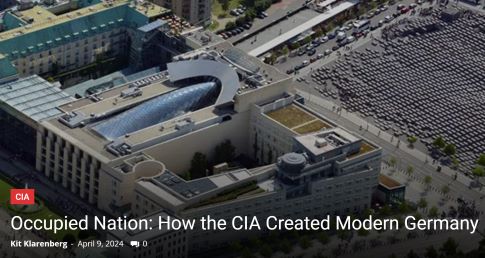Occupied Nation: How the CIA Created Modern Germany

The sprawling U.S. embassy in Berlin. [Source: spiegel.de]
On February 4th, The Economist published a devastating analysis—or perhaps, “pre-mortem”—on the collapse of the German Social Democratic Party (SPD) under Olaf Scholz’s stewardship. Elected in what the Western media contemporaneously branded a “shock” result in September 2021, hopes for his coalition government in many quarters were high. Today, he enjoys the worst approval ratings of any Chancellor in modern history, and national opinion polls place SPD approval at 15% or lower.
The Economist frames Scholz’s collapsed fortunes, and the prospects of his party’s imminent extinction as a serious force within German politics, as a microcosm of Berlin’s declining economic and political clout more widely. It notes that the nation’s finances have gone “limp” during his tenure, with business-sector confidence collapsing, and record inflation destroying citizens’ incomes and savings. Other sources have detailed the country’s “deindustrialization,” Politico coining the nickname, “Rust Belt on the Rhine.”
In keeping with those meditations on Germany’s ever-worsening woes, The Economist’s bleak diagnosis made no mention of how Western sanctions imposed on Russia in February 2022 created Berlin’s crisis. Scholz was a prominent cheerleader for the Biden administration’s push to “make the Ruble rubble.” Now that effort has so spectacularly backfired that it can no longer be ignored or spun otherwise; Newsweek admits “any realistic war game could have easily predicted” the sanctions would not only fail, but boomerang on the sanctioners.

Those few analysts who predicted the invasion of Ukraine well in advance universally failed to anticipate Berlin would support and facilitate any U.S. counterattack, particularly in the financial sphere. They believed Germany possessed the requisite autonomy and sense not to commit willful economic suicide in service of Empire. After all, the country’s stability, prosperity and power were heavily dependent on cheap, readily accessible Russian energy. Voluntarily ending that supply would be inescapably disastrous.
For this failure, they can be forgiven. Berlin, particularly in the wake of reunification, has successfully presented itself to the world as sovereign, led by sensible people acting in the best interests of their nation, and Europe. In truth, ever since 1945, Germany has been a heavily occupied nation, drowning under the weight of U.S. military installations, and its politics, society and culture aggressively shaped and influenced by the CIA.
This unacknowledged reality is amply spelled out in Agency whistleblower Philip Agee’s 1978 tell-all book, Dirty Work: The CIA in Western Europe. Comprehending who is truly in charge in Berlin, and what interests Germany’s elected representatives are actually serving, is fundamental to understanding why Scholz, et al., so eagerly embraced the self-destructive sanctions. And why the facts of Nord Stream 2’s criminal destruction can never emerge.

“Enormous Presence”
Following World War II, the United States emerged as the world’s undisputed military and economic superpower. As Agee wrote, the overriding aim of U.S. foreign policy thereafter was to “guarantee the coherence of the Western world” under its exclusive leadership. CIA activities were accordingly “directed toward achieving this goal.” In service of the Empire’s global domination project, “left opposition movements had to be discredited and destroyed” everywhere.
After West Germany was forged from the respective occupation zones of Britain, France and the U.S., the fledgling country became a particularly “crucial area” in this regard, serving as “one of the most important operational areas for far-reaching CIA programs” in Europe and elsewhere. Domestic Agency operations in West Germany were explicitly concerned with ensuring the country was “pro-American,” and structured according to U.S. “commercial interests.”
In the process, the CIA covertly supported the Christian Democratic Union (CDU) and SPD, and trade unions. The Agency “wanted the influence of the two major political parties to be strong enough to shut out and hold down any left opposition,” Agee explained. The SPD had a radical, Marxist tradition. It was the only party in the Reichstag to vote against the 1933 Enabling Act, which laid the foundations for Germany’s total Nazification, and led to its proscription.
Newly reinstituted following the war, the SPD maintained its revolutionary roots until 1959. Then, under the Godesberg Program, it abandoned any commitment to challenging capitalism in a serious way. It stretches credibility to suggest the CIA was not expressly responsible for neutering the party’s radical tendencies.
In any event, effective control of West German democracy ensured that Washington’s “enormous presence” there–which included hundreds of thousands of troops and almost 300 separate military and intelligence installations—was not challenged by those in power, irrespective of the party to which they belonged, despite a majority of the population consistently opposing U.S. military occupation.

This presence in turn granted the CIA “a number of different covers to work behind,” according to Agee. The majority of its operatives were embedded within the U.S. military, posing as mere soldiers. The Agency’s biggest station was an army base in Frankfurt, although it also boasted units in West Berlin and Munich. U.S. operatives were “highly qualified technicians who tap telephones, open mail, keep people under surveillance, and encode and decode intelligence transmissions,” working “all over the country.”
Dedicated divisions were charged with “making contact with organizations and people within the political establishment,” such as the SPD and its elected representatives. All the intelligence collected was “used to infiltrate and manipulate” the same organizations. The CIA, moreover, collaborated “very closely” with West German security services in many domestic spying efforts, the country’s assorted intelligence agencies conducting operations at the Agency’s direct behest, “often [to] protect CIA activities from any legal consequences.”

“Discredit and Destroy”
Intimate bedfellows as they were, there were nonetheless “difficulties” in the CIA’s relationship with its West German counterparts, per Agee. The Agency never fully trusted their protégés, and felt a pronounced need to “keep an eye” on them. Still, this lack of faith was no barrier to the CIA partnering with the BND, West Germany’s foreign intelligence service, to secretly purchase Swiss encryption firm Crypto AG in 1970. Perhaps this was done to “protect CIA activities from any legal consequences.”
Crypto AG produced high-tech machines through which foreign governments could transmit sensitive high-level communications around the world, safe from prying eyes. Or so they thought. In reality, the clandestine owners of Crypto AG, and by extension the NSA and GCHQ, could easily decipher any messages sent via the firm’s devices, as they themselves crafted the encryption codes. The connivance operated in total secrecy for decades thereafter, only being exposed in February 2020.

The full extent of the information collected via Crypto AG—along with key national competitor Omnisec AG, which the CIA also owned—and the nefarious purposes to which it was put is unknown. It would be entirely unsurprising though if the harvested data helped inform CIA operations to “discredit and destroy” left-wing opposition in West Germany and beyond, efforts that no doubt continue to this day.

The Cold War may be over, but Germany remains heavily occupied. It hosts the largest number of U.S. troops of any European country, despite an overwhelming majority of the population supporting their partial or total withdrawal in the years following the Berlin Wall’s collapse. In July 2020, then-President Donald Trump announced the withdrawal of 12,000 soldiers of the 38,600-strong contingent still there.

While intended to punish Germany for greenlighting the now-destroyed Nord Stream 2, polls indicated most Germans were only too happy to say “auf wiedersehen.” In all, 47% were in favor of them leaving, while a quarter called for the permanent closure of all U.S. bases on their soil. Yet, just two weeks after entering the White House, Joe Biden reversed his predecessor’s policy, returning 500 soldiers who had departed.
The President also scrapped plans to relocate the Stuttgart-based U.S. Africa Command, which effectively embeds Washington in the armed forces of 53 countries across the continent, elsewhere in Europe. Research shows the Command’s training programs have precipitated a significant rise in the number of military coups in Africa. As Agee attested, U.S. military bases are a hotbed of CIA spies. Berlin therefore must remain “one of the most important operational areas for far-reaching CIA programs” within and without the country, whether Germans like it or not.

CovertAction Magazine is made possible by subscriptions, orders and donations from readers like you.
Blow the Whistle on U.S. Imperialism
Click the whistle and donate
When you donate to CovertAction Magazine, you are supporting investigative journalism. Your contributions go directly to supporting the development, production, editing, and dissemination of the Magazine.
CovertAction Magazine does not receive corporate or government sponsorship. Yet, we hold a steadfast commitment to providing compensation for writers, editorial and technical support. Your support helps facilitate this compensation as well as increase the caliber of this work.
Please make a donation by clicking on the donate logo above and enter the amount and your credit or debit card information.
CovertAction Institute, Inc. (CAI) is a 501(c)(3) non-profit organization and your gift is tax-deductible for federal income purposes. CAI’s tax-exempt ID number is 87-2461683.
We sincerely thank you for your support.
Disclaimer: The contents of this article are the sole responsibility of the author(s). CovertAction Institute, Inc. (CAI), including its Board of Directors (BD), Editorial Board (EB), Advisory Board (AB), staff, volunteers and its projects (including CovertAction Magazine) are not responsible for any inaccurate or incorrect statement in this article. This article also does not necessarily represent the views the BD, the EB, the AB, staff, volunteers, or any members of its projects.
Differing viewpoints: CAM publishes articles with differing viewpoints in an effort to nurture vibrant debate and thoughtful critical analysis. Feel free to comment on the articles in the comment section and/or send your letters to the Editors, which we will publish in the Letters column.
Copyrighted Material: This web site may contain copyrighted material the use of which has not always been specifically authorized by the copyright owner. As a not-for-profit charitable organization incorporated in the State of New York, we are making such material available in an effort to advance the understanding of humanity’s problems and hopefully to help find solutions for those problems. We believe this constitutes a ‘fair use’ of any such copyrighted material as provided for in section 107 of the US Copyright Law. You can read more about ‘fair use’ and US Copyright Law at the Legal Information Institute of Cornell Law School.
Republishing: CovertAction Magazine (CAM) grants permission to cross-post CAM articles on not-for-profit community internet sites as long as the source is acknowledged together with a hyperlink to the original CovertAction Magazine article. Also, kindly let us know at [email protected]. For publication of CAM articles in print or other forms including commercial internet sites, contact: [email protected].
By using this site, you agree to these terms above.
About the Author

Kit Klarenberg is an investigative journalist exploring the role of intelligence services in shaping politics and perceptions.
Follow him on Twitter @KitKlarenberg.

























